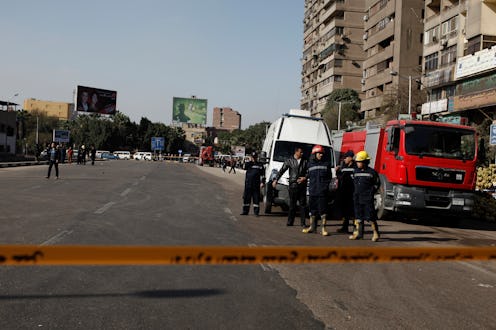News
A Mosque Bombing In North Sinai, Egypt, Leaves Hundreds Dead

A terrorist attack on Friday left hundreds dead at a Mosque in northern Sinai, Egypt. The attack drew attention not just for its size — perhaps the largest to hit the country in its modern history — but for its target. Recent years have seen Coptic Christians targeted by the Islamic State, but an attack on a mosque shocked Egyptians across the country.
The number of dead continued to rise throughout the day on Friday. Current estimates point to at least 235 people being killed and another 125 wounded. The perpetrators arrived at the mosque on four-wheel-drive vehicles, set off bombs inside the building and then fired shots at anyone who tried to flee, the Egyptian state media reported. The gunman even waited for ambulances to arrive at the scene and then shot at first responders too. There were also reports of a suicide bomber being involved in the attack. When security forces arrived, the attackers fled.
The mosque, Al Rawdah, is majority Sufi and located in Bir al-Abed, near Arish city along the Mediterranean Coast and on the highway that heads to the border with the Gaza Strip. The fact that the mosque was Sufi could have something to do with the attack, CNN reported. The Sheikh Eid al-Jariri, a cleric who founded Sufism in the Sinai, was born there. There are more conservative sects of Islam who don't approve of Sufism because of its mystical qualities. Groups like ISIS and its offshoots are among those who take issue with it.
Timothy Kaldas, a non-resident fellow at the Tahrir Institute for Middle East Policy, however told Bloomberg that it's difficult to pinpoint the reason they were targeted. "It is hard to know, however, if they were targeted because they were Sufis or because they were perceived to be collaborating with the government," Kaldas said. He did note that they seem to be enlarging the possible targets by targeting a mosque.
Thus far there has been no claim of responsibility from ISIS or any other terrorist group, but news reports are remarking on the similarity between this attack and the typical Islamic State-planned attack. The last time such a group hit Egypt on such a large scale was when they took down a Russian airplane full of tourists returning home from the resort city of Sharm el-Sheik, killing all 224 people on board.
There has been condemnation from around the world, including from President Trump, who wrote about the attack on Twitter. "Horrible and cowardly terrorist attack on innocent and defenseless worshipers in Egypt. The world cannot tolerate terrorism, we must defeat them militarily and discredit the extremist ideology that forms the basis of their existence!" Trump wrote.
The grand imam of al-Azhar mosque in Cairo, an important center for religious learning in the Muslim world also condemned the attack. “After targeting Christians, the turn for mosques have come,” the grand imam said in a statement. “As if terrorism wants to unite Egyptians in deaths and chaos, nevertheless it will be defeated, and the will of Egyptians will prevail.”
More than 50 ambulances arrived at the scene to ferry injured to hospitals. Scenes from TV news and Twitter, while not verified, are truly horrific. Blood-covered bodies are covered and lined up side by side in the prayer area of the mosque and outside. The New York Times reported that a medical officer at the hospital where most of the victims were being treated were overwhelmed. "We are swamped. We don’t know what to say. This is insane," the officer, who asked to remain anonymous, told the paper. He added that most of the bodies were riddled with bullet wounds.
The country's president, Abdel Fatah el-Sisi, declared three days of national mourning.